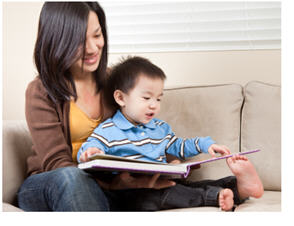
Mom's Sensitivity Helps Language Development
in Children with Hearing Loss
CORAL GABLES, FL; March 8, 2013—University of Miami (UM) Psychologist Alexandra L. Quittner leads one of the largest, most nationally representative studies of the effects of parenting on very young, deaf children who have received cochlear implants. The findings indicate that mothers who are most sensitive in their interactions with their children receiving cochlear implants have kids that develop language faster, almost "catching up" to their hearing peers. The report is published in the Journal of Pediatrics.
"I was surprised that maternal sensitivity had such strong and consistent effects on oral language learning," says Quittner, director, Child Division in the Department of Psychology, at the UM College of Arts and Sciences. "The findings indicate that pediatric cochlear implant programs should offer parent training that facilitates a more positive parent-child relationship and fosters the child's development of autonomy and positive regard."
The goal of the study was to understand the role of parental behavior in language growth for deaf children. Maternal sensitivity was measured in videotaped interactions with the child and defined by warmth, as the degree to which a mother expressed positive regard and emotional support of the child.
Participants were 188 children with severe to profound loss of hearing, ages from five months to five years. In addition to analyzing the effects of maternal sensitivity, on language development, the study also looks at the impact of cognitive and language stimulation. Parent-child interactions observed and coded included free play, puzzle solving, and an art gallery task with five posters mounted at different heights on the walls of the playroom.
The largest improvements in language development were observed in children whose parents displayed high sensitivity; Language stimulation was also an important predictor of language gains, but was most effective when delivered in a sensitive manner. Deaf children with sensitive parents had only a 1 year delay in oral language compared to. 2.5 years among those with less sensitive parents.
This cohort of deaf and hearing children has now been followed for approximately 8 years post-implantation; NIH has just funded the competitive renewal, allowing the researchers to follow them for another 5 years, into adolescence. The aims will focus on their cognitive and social development, as well as their academic achievement.
March 8, 2013
Contributors include the UM Cochlear Implant Team, including the Director of the Barton G Kids Hear Now Program, Ivette Cejas, assistant professor, Department of Otolaryngology; David Barker, assistant professor at Brown University; John Niparko, Chair, Department of Otolaryngology University of Southern California (USC); Laurie Eisenberg clinical professor at USC and House Ear Institute and Emily Tobey professor, University of Texas in Dallas.
